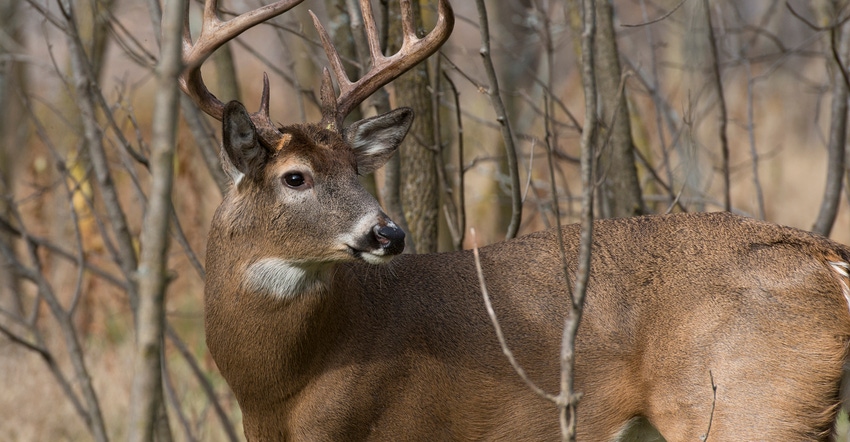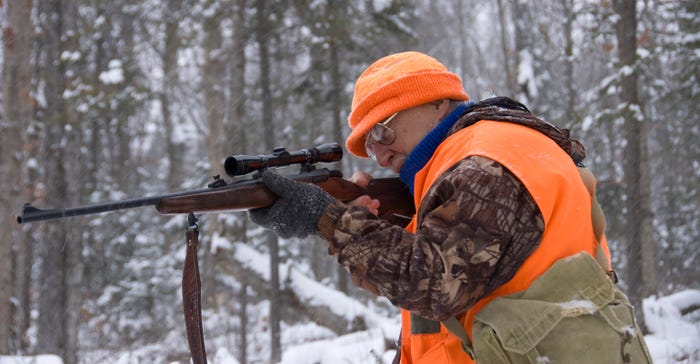
It’s been a warmer-than-usual November thus far, but hunting season is right around the corner.
In some states like Michigan, rifle hunting season is already well underway. New York’s rifle hunting season — south of the Adirondacks — starts this weekend, while West Virginia’s season starts Nov. 23.
Pennsylvania hunters can take to the woods the Saturday after Thanksgiving — Nov. 28 — in most places, while Ohio’s firearm deer season starts Nov. 30.
It’s an exciting time if you like the taste of venison or just long for the thrill of the kill, but have you thought of everything you need out there in the woods? Does the hunter who’ll be roaming your farmland know what’s expected of them when they go out and hunt?
Lindsay Thomas Jr. of the National Deer Association says it’s a good idea to have your rules for the hunt in writing before you allow anyone on your land, if you haven’t done so already.
“I think it's just a good idea. I’d get it down in writing, for clarity and communication if for no other reason," he says.
Some of the things he recommends in an agreement are:
• Require hunters to provide their own hunting liability insurance for their protection and your protection.
• Establish “hunting” and “no-hunting” zones, and provide maps if needed.
• Ensure property boundaries are well-marked to help hunters remain on your land and avoid trespassing on neighboring lands.
• Provide guidelines on what stands hunters can use and, if possible, designate stand sites.
• Establish days of the week and hours of the day when hunters may actively hunt.
• Establish a check-in or notification system, so hunters can notify you of the days or times they’ll be hunting.
• Designate parking areas, access routes and any “off-limits” areas.
• Provide instructions on where hunters may take their deer to field-dress, skin and clean.

Always keep your firearms unloaded until you are in position and ready to hunt. And never point a firearm at anyone or anything you don’t intend to kill, regardless of whether it is loaded or unloaded.
Thomas says it’s also a good idea to collect mobile phone numbers, email addresses or other contact information from each hunter, as well as set any rules regarding litter, alcohol and anything else you don’t want to happen on the property.
Speaking of litter, Thomas says this is one of the biggest complaints the association hears from property owners each year. For hunters, it might be the difference between being welcomed back or told to never come back.
“You want to go out of your way to maintain that access," he says. "Make that person’s land better than you found it. Close the gates, share your venison with the landowners."
Remember the essentials
Don’t go out hunting without remembering some of the basics, Thomas says. Don’t forget these essentials:
• valid hunting license and identification
• safety orange apparel as required by state regulation
• safety harness for hunting elevated stands
• binoculars for wildlife and target identification
• fully charged cellphone for safety
• skinning knife
• disposable latex gloves for field dressing
• toilet paper
• flashlight for entering or exiting stands in the dark, and for blood-trailing after sunset
• insect repellent for warm-weather hunts
• insulating layers for cold-weather hunts, especially for the feet, hands and head, and waterproof layers for rain
• water and snacks for lengthy hunts
Be safe
Of course, nothing is more important than hunting safely. Thomas has some safety tips:
• Always keep firearms unloaded until you are in position in your stand or blind and ready to hunt. Unload again before you leave your stand.
• Never point a firearm at anyone or anything you don’t intend to kill, regardless of whether it is loaded or unloaded.
• Know and follow your state’s requirements for wearing fluorescent orange clothing.
• Use binoculars to study wildlife or other movement you see; don’t use a rifle scope.
• Identify your target before aiming or firing. If you’re hunting deer, you should be able to identify a deer as a buck or doe so that you can determine if the deer is legal for harvest in the location and time you’re hunting.
• If you’re hunting from an elevated stand, wear a safety harness. It should be connected from the time you leave the ground until you climb back down.
• When hunting with others, agree upon and communicate stand locations. Set times when everyone should be stationary and times when it’s OK to move from stand locations. Also, share phone numbers for communication in case those plans change.
• If you’re hunting alone, tell a family member or friend, and let them know the location of your stand and the time to expect your return.
Hunting regulations vary by state. Click on the links below to see hunting regulations where you live:
• Pennsylvania
• New York
• Maryland
• New Jersey
• Delaware
• West Virginia
• Vermont
• Massachusetts
• Connecticut
• Maine
• New Hampshire
• Ohio
• Michigan
About the Author(s)
You May Also Like






